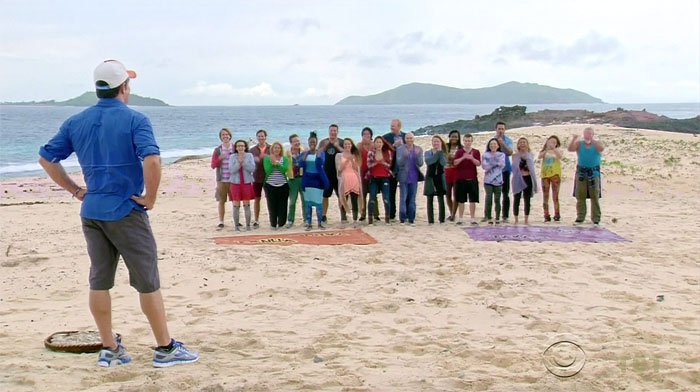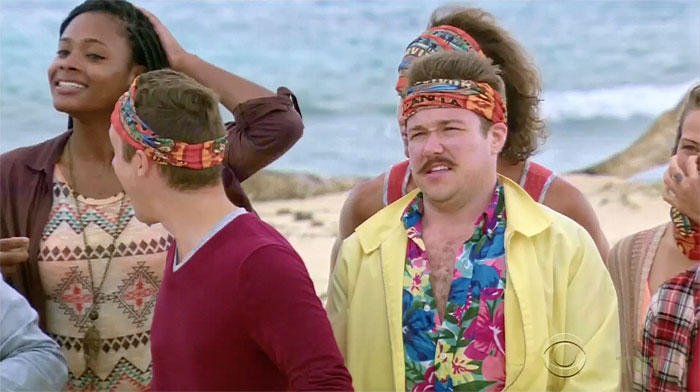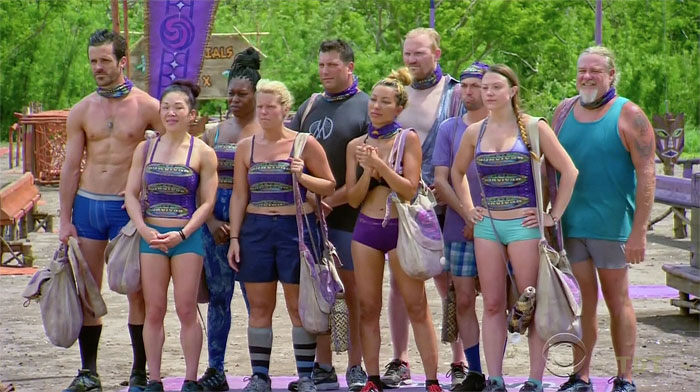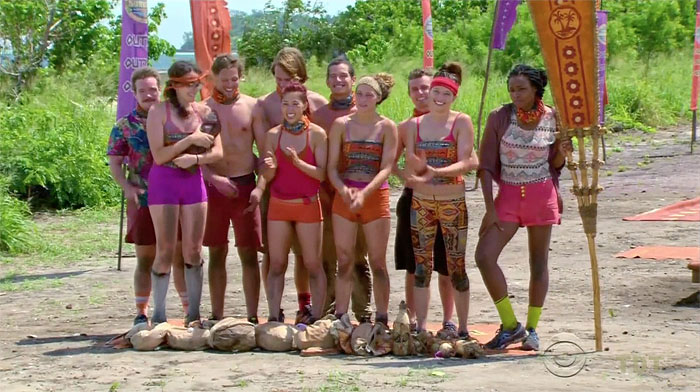

Survivor kicked off its 33rd season with what I thought felt like a pretty good premiere. A lot of times, the first episode builds up a couple big characters and then ends with a really predictable boot. While the end did feel predictable, I felt like we received a decent intro on almost all the castaways while, at the same time, some big personalities emerged.
In the first season premiere for which I wrote this here column, I used social identity theory to discuss Second Chances. For the second season premiere, well, I used social identity theory with a little bit of ol’ priming to examine Kaoh Rong. My point? At the beginning of each season, at least lately when the show incorporates a clear theme, there’s a strong emphasis on making sure each tribe understands how to incorporate said theme into their group identity. And that happened here on MvGX, but not quite as much.
Let me explain. Usually when Survivor incorporates a theme, let’s say, beauty v. brain v. brawn, the castaways easily fit into a category. Even when a player doesn’t at all seemingly work within said categorization, the label is so enticing, the player can buy into it. I mean, everyone wants to be considered smart or strong or beautiful, right? But for a generational twist, it’s not all that easy.
What do I mean? Well, I think one of my favorite TV writers, Willa Paskin over at Slate, said it best when discussing Generation X on this season: They “are no longer winking and smoking and cracking caustic jokes in the corner; they are simply un-Millennials and old Americans who believe in the power of work.”
And this is the thing, when people hear Generation X, we think about Reality Bites and grunge music and a generation of folks who love irony. Now, according to Survivor, we’re all one step away from telling the youngsters about values and how to make America great again. According to Survivor, everything is a duality: There’s the young generation and the old one. It doesn’t matter that, for example, at least in theory, Generation X grew out of an abject hatred for the Baby Boom ideals. Everyone’s old now and wants those young ins with their flip phones, SnapFace and lack of a work ethic off their lawn.
But for Survivor to get that dynamic, they can’t just rely on desired group values emerging. Why? Those values aren’t real. So that means Jeff Probst needs to prime.

Remember priming from last year? It’s a mass communication theory (often used in psychology also) that argues that when you introduce one piece of information to someone, if that bit is made salient, it will impact how a person interprets the next piece of information that enters their brain.
For example, I’ve become obsessed with this study done out of Zurich. Basically, these researchers wanted to find out if being a Wall Street executive made you more likely to make risky choices or, if you were already that kind of person. So, the researchers made two groups of Wall Street executives. One group simply read some potentially risky situations and then reported how they would handle them. But the other group was primed with numerous innocuous questions telling them they were Wall Street executives. This prime made their occupations salient and forced them to think of themselves in this way while answering the questions about the potentially risky situations.
This is what Probst did early this episode. He started the season by telling the groups they had “two very different philosophical approaches to life.” Are we sure about that? I’m not. Then Probst tells the Millennials that “they don’t want to work” and Gen X that they “tore down the walls, (but) now you’re the old next to the heir apparent.”

This is priming. Each group might not at all feel this way, but Probst tells them this is their group. He’s making that info salient. And he does it over and over again like when the Millennials choose the chicken. It keeps happening. And you have to wonder if it affects how they act all season.
In this case, the priming may not have had a direct impact on Rachel’s ouster, but you do have to think it might have. Rachel clearly acted the most “Millennial” of any player, giving orders like she knew what she was doing (irrational confidence) and not making the social connections needed for later in the game (self-obsessed). Who knows? Even though David was clearly the worst castaway on that tribe for a variety of reasons, the Millennial-like Rachel goes home.
What I do know, though, is this priming could have a significant impact as we move forward, especially when a tribe swap comes. I’m excited. But let’s take a look at how I’m thinking about individual players now:
Gen X — Takali

- Chris — Was there a more obvious castaway coming into this game than Chris? When you only read the bios, sometimes you get a contestant completely wrong. But, Chris, well, I would have bet large sums of money that Chris would take a leadership role, build an alliance and get shelter going. He screamed old-school player and lived up to his billing. On this tribe, I like where it’s going. If Gen X merges down in numbers, bye bye Chris. By the way, does Chris have any idea that if you have an alliance of six and you split the votes 3-3, the other group could all vote four strong? I’m not sure if that’s a good precursor for how he plays this season?
- CeCe — I thought really highly of CeCe going into the season, but between the edit and her clearly being on the outs, I’m thinking I got this one wrong. Obviously, we’re only seeing a little bit of tons and tons of film, but CeCe didn’t even seem to be trying.
- Ken — Oh my gosh, Ken. This dude is definitely someone who seems wholly different now that I’ve seen some video. I mean, his mannerisms, his odd accent, the way he tried to take charge … it was hilarious. I predicted Ken enjoyed himself some trips to the dispensaries here in Colorado, now I’m pretty sure of it. This guy’s a trip. He’ll definitely get along with the Millennials if he makes merge. That’s not surprising, of course, since he is a Millennial, but I’m digressing.
- Bret — He’s another I got wrong. On paper, I thought Bret might not be a great winner pick. Now that I’ve seen him and watched him interact with others, I think he might have a chance. He impressed me. Of course, like Chris, I think Bret needs numbers at a merge. He might not need them as much as Chris, but it’s close.
- Jessica — So Millennials have a reputation for just loving the tattoo. Well, many of them sure indulged in tattoos. But, you know, don’t ever say the Millennials don’t learn from their elders. Now, remember it’s first glance, but I didn’t see any outright horrid, regrettable tattoos on the young tribe. Now, the Gen Xers on the other hand, well, we definitely saw tatts I’m sure folks regret. Why am I writing this under Jessica? I can’t imagine …
- David — Let me be honest, usually I like the neurotic, nerdy scheming character. When it’s someone like Stephen or Spencer, I usually root for them. But David, well, David has a Cochran 1.0 vibe and that person just bothers me. I simply can’t understand when people have neurosis that are so very clearly going to be a minus in the game and they can’t even try to hide them. I don’t know. Maybe I’m wrong, but when someone’s blocking their ears while someone tries to chop wood, well, you’re trying to play a character and it’s not working out so well.
- Lucy — Wait, was there a Lucy on the show?
- Paul — I thought Paul would be like manna from heaven for entertainment purposes. I’m not sure if that’s going to happen now. But I did love how Probst also primed Paul as the oldest and then he quickly took on a fatherly role with his many lovely speeches. Hopefully next time he just starts singing “Hot for Teacher” or something.
- Sunday — Her name’s Sunday, she loves the big J and she preaches to the yutes. Other than that, the only thing I learned about Sunday is that she put herself into a good position on the tribe. I’m liking her merge chances.
Millennials — Vanua

- Adam — I kind of thought Adam would play a more prominent role on this tribe, but aside from a couple early confessionals, we really didn’t see him. I still like his chances to succeed this season, but only because of someone else …
- Mari — Oh Mari, are you finally going to make me look smart with one of my preseason picks? I have to say, between Mari and Hannah, we have the makings of a pretty awesome blindside. And since I now think the Millennial tribe will fare better this season, I really do think Mari could win this thing. I’m not switching the winner pick yet.
- Hannah — Now Hannah also looked great this week, way better than I thought. But, and this is a big but, she seems like she’s going to be more visible than Mari in terms of over machinations. That’s not a good thing. I think Hannah will be targeted before Mari, and that means my winner pick prevails!
- Michelle — That braid. That’s all I’ve got. Man, that braid.
- Taylor — Could they have found a more ridiculous stereotype? There are so many Taylors here in Boulder, Colorado. I think we have more snowboard instructors per capita than anywhere in the world. That’s a joke, but it’s also serious. And many sound like Taylor. Take that for what you will.
- Zeke — Zeke is the best example of needing to see someone on video to get the full story. Holy poop his voice is not what I thought. Holy poop I love him more than I thought. And holy poop he’s got a better chance than I thought, even if I still don’t think he’ll win.
- Jay — My preseason proclamation stands: Outwitting isn’t something this bro can excel in.
- Michaela — Here’s another person I totally misread. While I thought Michaela could do well, now I think she’s got a real shot at going very far. I like her a lot.
- Figgy — Here’s someone I read perfectly. Figgy, well, I’m thinking she ain’t going so far. Millennials are known for self-centeredness. That doesn’t mean selfish, just an idea that the world revolves around them, that they’re far more amazing and unique than they actually are. I’m thinking Figgy fits the trophy culture perfectly.
- Will — Reagan and Jesus. Sorry, not getting past it yet.
And with that, I’m already excited for next week. I thought this episode predicted some promising things for the rest of the season. Let’s see.
 Pat Ferrucci started watching Survivor when Episode Two of Borneo first aired. He's seen every episode since. Besides recapping here, he'll be live-tweeting this season from the Mountain Time Zone. Why? Because nobody cares about the Mountain Time Zone except when they want to ski. Follow him @patferrucci for Survivor stuff and tweets about anything and everything that enters his feeble mind.
Pat Ferrucci started watching Survivor when Episode Two of Borneo first aired. He's seen every episode since. Besides recapping here, he'll be live-tweeting this season from the Mountain Time Zone. Why? Because nobody cares about the Mountain Time Zone except when they want to ski. Follow him @patferrucci for Survivor stuff and tweets about anything and everything that enters his feeble mind.
- Index of articles
- Cast preview: And the winner? I don't know?
- Ep.1: All about the power of the prime
- Ep.2: Michelle guides the organism
- Ep.3: Paul's poorly framed response sinks him
- Ep.4: Dissonance dismisses silence
- Ep.5: David continues forcing others to innovate
- Ep.6: Figgy sees selectively, gets the boot
- Ep.7: Michaela gets dysfunctional and gets dys-boot
- Ep.8: How the castaways stack up post-merge
- Eps.10-11: Jessica's dismissal just part of the agenda
- Ep.12: Will seeks his trophy, Zeke hits the road
- Ep.13: Who holds the most finale power?
- Pre-Ep.14: Jury jeopardy